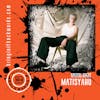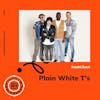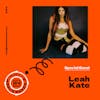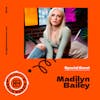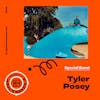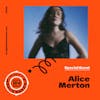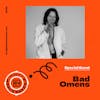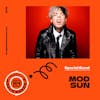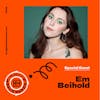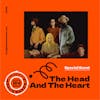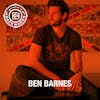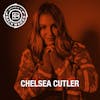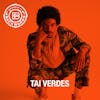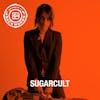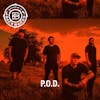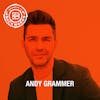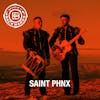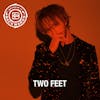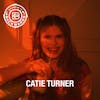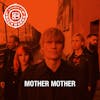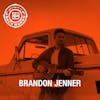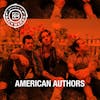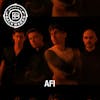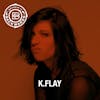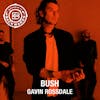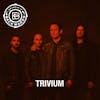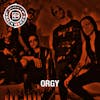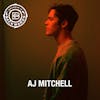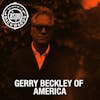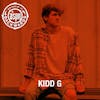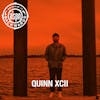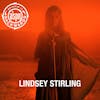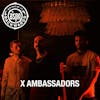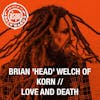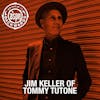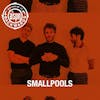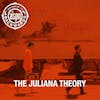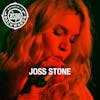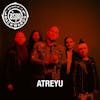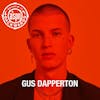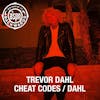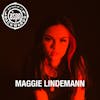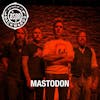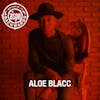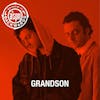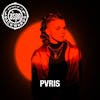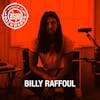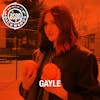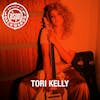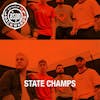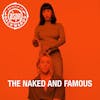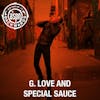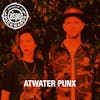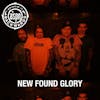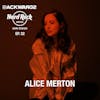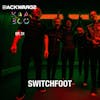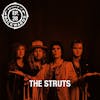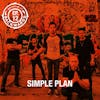Interview with Ben Abraham
We had the pleasure of interviewing Ben Abraham over Zoom video!
award-winning singer-songwriter Ben Abraham recently released his sophomore album Friendly Fire (which has already done almost 10 million streams!) The album is a really beautiful +...
We had the pleasure of interviewing Ben Abraham over Zoom video!
award-winning singer-songwriter Ben Abraham recently released his sophomore album Friendly Fire (which has already done almost 10 million streams!) The album is a really beautiful + deeply personal body of work that highlights Ben’s almost decade-long odyssey navigating both his sexuality + spirituality following the release of his debut album Sirens.
Another Falling Star is based on a conversation Ben had with Kesha about “getting high in Hollywood” and about the countless artists who move to LA with high hopes + big dreams. (The two also co-wrote her double-Platinum, Grammy-nominated smash single “Praying” together).
As for the inspiration behind the album -- following the release of Sirens, while engaged to his longtime girlfriend, Ben became romantically involved with another man – ending the relationship and resulting in a huge crisis of faith for him as a devout Christian. He detailed this in a powerful note to fans last month.
Sirens was met with critical acclaim upon its release in 2014, including from the New York Times who heralded it as “a debut of remarkable depth.” The record catalyzed his career as an in-demand songwriter for artists like The Chicks, Gallant, Ben Platt & Demi Lovato.
We want to hear from you! Please email Tera@BringinitBackwards.com.
www.BringinitBackwards.com
#podcast #interview #bringinbackpod #FriendlyFire #BenAbraham #NewMusic #zoom
Listen & Subscribe to BiB
https://www.bringinitbackwards.com/follow/
Follow our podcast on Instagram and Twitter!
https://www.facebook.com/groups/bringinbackpod
We'd love to see you join our BiB Facebook Group.
1 (27s): Hello, is Adam. Welcome back to bringing it backwards. A podcast where both legendary and rising artists tell their own personal stories of how they achieve stardom. On this episode, we had a chance to hang out with Ben Abraham, over zoom video. Ben was born and raised in Melbourne in Australia, and he talks about how he got into music. Both of his parents were in a pop duo in Indonesia. They were really, really famous and they ended up moving to Melbourne. And while there became really involved in a church. So Ben was raised in the church. That's how he also kind of got into music, was a piano player. Didn't pick up a guitar until he was in his twenties. Actually, he was working at a children's hospital. 1 (1m 8s): He picked up the guitar there and ended up writing a song with the 13 year old, showed it to the hospital. They loved the song and it became the song that he would go out and perform at different fundraisers. Kind of validating him as a songwriter from there is when he decided to start songwriting as a career, he put a record out called sirens. We talk about that. Moving to Los Angeles, scoring a publishing deal, which allowed him to write with a bunch of different songwriters and artists in Los Angeles. He ends up building a real close bond with Casha wrote the song, praying with Casha around the same time he was struggling with a lot of life things. 1 (1m 50s): He actually put a Instagram post out about it. You could read it on his Instagram page. He put it out in February of 2022. So you could check that out kind of backlogging what was happening in his, his life, which led to releasing this new record, which is called friendly fire. And we hear about that and the song, another falling star, which was inspired by Cassia, but not in the way you would imagine the title has nothing to do with her. It was aligned. She said in a phone conversation. So he talks about that as well. You can watch the interview with Ben on our Facebook page and YouTube channel at bringing it backwards. It would be awesome if you subscribe to our channel like us on Facebook and follow us on Instagram, Twitter, and Tik TOK at bringing back pod. 1 (2m 36s): And if you're listening to this on Spotify, apple music, Google podcasts, it'd be amazing if you follow us there as well, and hook us up with a five star review. 2 (2m 45s): We'd appreciate your support. If you follow and subscribe to our podcasts, wherever you listen to podcasts, 1 (2m 51s): We're bringing it backwards with Ben Abraham. Well, this podcast is all about you, your journey in music, and we'll talk about the new record. 3 (2m 59s): Great, 4 (3m 0s): Awesome, awesome. Born and raised in Melbourne. Is that what I read? 3 (3m 4s): Yeah. Melbourne very, very well done. You said that before. 4 (3m 8s): I have, you know, I've, I've met, I've met a few, a few people from Melbourne and a lot of people, you know, Melbourne. Yeah. I'm going to cut it, but I always get complimented on knowing how to say it correctly. 3 (3m 18s): It's impressive. I would accept Melbourne. I think it's just the quickness of the second syllable. It's just a born. That's very, obviously you've never been there. 4 (3m 29s): I've never been there either. I actually, we used to work with a guy from there, so he I'd hear him say Melbourne and all the time, and then it just landed it stuck. And now I sound like I know what I'm talking about. What was it like growing up there, 3 (3m 44s): Growing up in Melbourne, growing up and I love Melbourne. Melbourne's like, how do I describe Melbourne? I, as a city, I always say Sydney's because Sydney and Melbourne are like really the only two cities in Australia that you need to know about cities, the hottest person at a party. And these are the hot person at a party. And Melbourne's the interesting, the most interesting person at a party. So certainly as a musician, I Melbourne was the best place to kind of incubate as a young artist because I think it's cold. There's not a lot to do. So everyone's a bit more thoughtful and creative and like Sydney, everyone's just surfing and it's sunny and beautiful, but Melbourne's like where all the authors and poets and depressed artists live. 3 (4m 32s): So it was the perfect environment for me to kind of hone my craft as a singer songwriter. 4 (4m 37s): Okay. 3 (4m 38s): And yeah, audiences, you know, I would just really receptive to like going out and seeing live music and stuff. So I, growing up in that environment was great. My parents are musicians. It was just a good environment to kind of, to grow up amongst. 4 (4m 55s): Yeah. Were they still doing it? And when, when you 3 (4m 58s): Know, so they, by the time I was born, I mean, they were still, they are still like sing is, but by the time I was born, they were very involved in church. And like, they would play music, but only in the context of church and 4 (5m 14s): Then like a pop band. Right. That's 3 (5m 16s): Right in Indonesia before me and my siblings were born, they, my mom's Australian, but she lived in Indonesia where she met my dad and they were pop stars. They have a song even now, like most people don't know who my parents are, but if you sing the song, you could grab anyone on the street in Indonesia. And they will know the song that my parents sang. 4 (5m 36s): That's so cool. It's clear. I'm sure you've been, I would imagine 3 (5m 40s): I've been, yeah, I haven't. I think that my parents are in the Indonesian rolling stone hall of fame. 4 (5m 46s): No, you shouldn't strive for that as well. Then, you know, parents in there that'd be awesome. 3 (5m 53s): Okay. I need to chase that down. Yeah. I need to get an Indonesian publicist under it. Yeah. So I've been there a couple of times, but it's funny. I don't think I grew up knowing about my parents being famous, but like in Indonesia, but it didn't really sink in, like how kind of significant their music career there was until I was like, in my thirties, like I was much older. 4 (6m 17s): Really. Was there like something that a moment, the urge you go there, 3 (6m 21s): I think it just grew up and it was a fact of our lives and it wasn't until I was like fully in the swing of my music career that I was like, okay, wait, like when you say you guys like had a big song and then I would just like researched it and looked at, and I was like, oh, like, you're famous. 4 (6m 35s): You're like a smash. 3 (6m 37s): Like, cause I guess when you're a kid, you just don't that stuff just doesn't register. You're like, oh yeah. That's just like my parents. That was their job or whatever, like before. Right. It's like, there was always just these photo albums of them singing at like big festivals and stuff. But it just, none of it registered that it was a big deal until I was, you know, playing festivals. And then I was like, oh, you guys have done all this, which is funny then like with their relationship to my music career is quite funny because they are both very excited about everything that's going on. But also I just get extremely detailed, like feedback from them because they're musicians. 4 (7m 13s): Like 3 (7m 13s): If I show them a demo or something, my mom's always more emotional feedback, but still will be like, there's not enough passion in your vocal on this. And then my dad will say things like, yeah, I don't know about that. The snare feels like it's been mixed in a weird way in that song with it. And I'm just like, guys, this, 4 (7m 31s): Do you take any of it and bring it back to the minister. Go, okay. Yeah, I'll look into it. 3 (7m 38s): The favorite, my favorite was one where I sent them like a link to Spotify to like, oh, this song just came out. But I don't think I specifically said the songs came out. I just sent them the link and was like, Hey, here's my new song. And my dad was like, this is great. But I think you could. I actually think you should pitch this one up like a STEMI tight. I think that you can really hit that note better. And I was like, dad, this is out. This is 4 (8m 1s): The record is done. This is 3 (8m 3s): Not, This is not an opportunity for you to give me like feedback. And it was like, oh, in that case, I love it. It's perfect. 4 (8m 10s): That's hilarious. Did, were they, you know, skeptical about you pursuing a career in music? 3 (8m 17s): No. That's one thing. That's great. I think my dad Indonesians or some musical and they're also like, they're not that kind of Asian cliche of like forcing their kids to like be high achievers. And my parents are just like chill people. So they, they will like, you don't want to go to university don't you have to do that. You don't want to do this like that. You want to pitch your music, go for it. Like they just w always pretty relaxed about that stuff. 4 (8m 47s): That's cool. 3 (8m 48s): But yeah, but then with that comes, like they definitely, if I was sending up to the point at home when I would play a in Melbourne and they would be like, and do we have to come to this one? Or do you want us to, which I love, I mean, I, I liked that. They're just very relaxed about the whole thing. That's 4 (9m 8s): Cool. They're like, so you said it's on Tuesday. 3 (9m 11s): Yeah, that's right. And they were never as blunt as I just made it, it would more be like, and did you want to set this one or is this one that you don't really need us? And I was like, it's fine, guys. You can see. 4 (9m 24s): Okay. That's pretty funny. So when they moved to, 1 (9m 27s): Hey, everyone, we wanted to tell you about another music podcast that we've been loving, the broken record podcast from Pushkin industries, music industry icon, Rick Rubin, along with producer, Justin Richmond and authors, Malcolm Gladwell, and Bruce Headlands. Sit down with the artists. You'd love for unparalleled creative insight into your favorite music. You'll hear revealing interviews with some of the most legendary figures in music like Neil young, Andre, 3000 Alicia keys and Bruce Springsteen. And you'll learn about up and coming stars like Michelle Zauner, who talks about her big plans for her dreamy indie pop band, Japanese breakfast. This April, they're celebrating the red hot chili peppers, new album with John for Shantay Anthony Kiedis flee and Chad Smith, all in conversation with Rick Rubin. 1 (10m 15s): They share stories and songs from the new album, and also never before heard insights about their decades, long dynamic and chemistry, listen to broken record wherever you get podcasts. 4 (10m 27s): So back to Australia, to Australia, when you guys were, when you had, they had you, and that's when they got back involved in the church, or were they always involved in the church? 3 (10m 36s): Not always. They became Christians in Indonesia have very sort of radical experience and they weren't raised as Christians, but had like a radical conversion then moved to Australia and fruit sort of, kind of entertained a music career in Australia, but then got involved in this sort of very intense church that was filled with like university students in the eighties, and then just sort of changed and decided that they didn't want to pursue a music career anymore and were more interested in doing the church thing, always music focused, but just in a different context. 4 (11m 13s): Okay. So you must've been pretty involved with what in the church as well. And when I got through them, as well as, 3 (11m 20s): Yeah, there are five kids in my family, all of us are musical and we all just grew up playing. I mean, I didn't even think about it as being involved or not involved. It just was life Playing. Cause my parents would like run the music team at whatever church we were going to as kids. And so we would just, I mean, I w I didn't really, like, I was very young when all that was happening, but it was just part of our lives. So we would just like sing at Christmas time, stuff like that. And then, yeah. And then as I got older, that really the first couple of songs that I wrote, but like, as a teenager writing like church choruses. 4 (11m 57s): Okay. 3 (11m 59s): Which was kind of, again, it's a nice sort of stress-free environment to try and try your hand at writing music. 4 (12m 6s): Right. And you have like a built in audience. 3 (12m 8s): Exactly. Exactly. 200 people to sing a song that you just wrote 4 (12m 15s): Or watching for hormones. 3 (12m 17s): Exactly. Exactly. 5 (12m 19s): Exactly. 4 (12m 21s): Well, when, well, actually, what was the first instrument you learned how to play 3 (12m 25s): Piano? I grew up playing, we learned Suzuki. So we learnt like playing by ear. My dad was a sooky with funnily. My dad was a Suzuki flute teacher, and I did learn the flute a little bit, but not that much. So this is part of like my head such hill you'd think like he was a flute teacher. Why wouldn't he teach all of his kids, the flute, but I don't think any of us really wanted to learn it. And he was like, okay, 5 (12m 50s): That's cool. 3 (12m 52s): Yeah. Piano. And then it wasn't until really my twenties that I like picked up a guitar 4 (12m 58s): Really. Is that when you started, I mean, obviously this, you know, the, the career you have now is, you know, singer, songwriter, guitar kind of driven, but like with piano, were you writing songs on piano prior and like performing? 3 (13m 13s): Yeah. I wasn't performing them out places once I started, like, once I transitioned into like playing music outside of a church context and just like, kind of doing it as an artist, that's when I, my first few gigs, I had like a friend who had played guitar for me. And I remember one time bringing my dad's guitar to a show being like, I'm going to play guitar tonight. And at the end of the show, my friend, the guitarist was like, you shouldn't do that. I mean, I was pretty bad and it's funny, like I'm still not a good guitarist. Like, I'm fine. I can do what I need to do. And I can make the guitar sound how I need to sound for my songs, but I am not a good guitar. 3 (13m 57s): So, and I, you know, I don't have any ego about that. I wish I was better, but I, I kind of look, I learned to do it by necessity because it's so annoying to travel with a piano and so much Travel with a guitar, but that's kind of what I did for a lot of the early gigs. So I was kind of forced myself to just have to learn how to play 4 (14m 19s): Guitar it, and you kind of use it as like a vehicle to, to write and perform your songs. Yes. 3 (14m 25s): Yeah. And I do find it interesting as a songwriter. I write differently depending on what instrument I write on. So the guitar also like then opened up a different style of writing and a different way of hearing melody and stuff. Just, I think naturally because I can only play in like G or C, 5 (14m 45s): So 3 (14m 46s): Sort of, I ended up writing a lot of songs. 5 (14m 48s): Excuse me. 4 (14m 52s): I think it's funny that you said that it wasn't as like, you know, with a piano, it's not as easy to travel with. I interviewed a guy, Andrew McMahon. He was in, he Andrew man in the wilderness, but he's got, he had a couple of other bands and we were talking about the first man, he was in something corporate. And like, he toured with a grand piano. Like you would push the thing. Like, he was like, what's that like adamant? I'm like, why did you not just use a keyboard? He's like, I, we needed the grant. You know, I'd push it through like the back of a dive bar in Denver, whatever it was. I just thought it was Dickey. 3 (15m 26s): I mean, I, in terms of the moment on stage, I get it. Like when you're like, you can't compare a real piano to a keyboard, not just, it's not just about the sound, it's the feel it's the, you, you can't compare it. So I, I understand that instinct, but for me, the process of like touring and just the hassle, oh my God. By that point, I'd get on stage and I'd be so resentful that I had to wheel the thing in. 4 (15m 54s): She was like, I'm done. You want to play 5 (15m 58s): Well. 4 (15m 59s): So you said in your twenties is when you picked up a guitar and started writing songs 3 (16m 3s): 21, 22. I think it was when I first played guitar. 4 (16m 6s): And when was that after you had already begun songwriting and wanted New York sued that 3 (16m 14s): I didn't know that I wanted to pursue it. I had written some church songs, So I knew that I could write a song. I wasn't writing with the intention of like really performing them outside of that context at all the guitar came about because I got a job as 21. I got a job at a children's hospital for a children's charity in Melbourne. And we used to do ward rounds. I worked with like a team of people that would do like distraction therapy. So we would host kids in our space or we would go and visit kids on the wards and basically just try and make them laugh and stuff while they're having procedures done, or just, just distract them from the environment of the hospital. 3 (16m 54s): And they encouraged For 10 years. So actually finally, my only other cause I didn't go to university or anything. So really my only two skills in life are music or child care, 4 (17m 10s): But entertaining children. I mean, that's, <inaudible>, 3 (17m 14s): It does tell you a lot of skill. I mostly played Mario kart and just like thrashed ten-year-olds at Mario kart. That was kind of, One of the things that we would do is, is on our ward rounds. They encouraged us to use whatever skills we had. And some of the, some of my team mates would do like magic tricks or kind of jokes or like balloon making and things. And there was a crappy old guitar. So I just grabbed that and kind of forced myself to learn. So that's really the first moment that I had played a guitar. And just like in the very safe environment of the Royal children's the wards of the Royal children's hospital, just like hacked out, you know, you are my sunshine on guitar. 3 (17m 57s): I taught myself how to play. And that was, that was really the first I ended up writing a song with one of the kids on one of the wards about the hospital and showed it to my bosses. And they were so impressed that they then flew me around the country to sing it at all of their fundraisers. And that really, that experience Between being just a dude who'd like played music on the side to realizing that I actually enjoyed it and could see a way for it to be my career. 4 (18m 26s): What are you like validating moment there at the chair or not at the hospital. Wow. 3 (18m 30s): I call you. And then like, so I, you know, I played it, I remember at the fundraiser and Sydney and like, they raised just like a shitload of money from like that night, not just because of me, but I'm sure I was just part of this like very celebratory night. And I was like, this was fun. And then I played it in Adelaide and I played it in Brisbane and Perth and just like all around the country, got to tell the story and play the song, see the impact that that whole thing had on people. And I was like, this is very fun. Like if music was this, I could do this. And that was really when I began like writing songs that were not remotely like religious, they just weren't songs about life and about people around me and things. And yeah, that's where it happened. 4 (19m 11s): Did you release that song? 3 (19m 12s): No, there's a video of it on YouTube, but I never, I nearly put it on my first album and it's, I have these certain songs in my life. I don't know why this is, but I just, I get in my head about them and we never ended up putting out a version of it, but I've always thought maybe one day I would, it's called let your light. And it's on YouTube. If you kind of look it up. And I wrote it with a 13 year old eating disorder patient at the Monash hospital in Melbourne. 4 (19m 38s): Wow. That is really good. I'm looking it up right after this. That's such a cool story. And then that ended up leading into, you know, pursuing this and, and 3 (19m 49s): That was just the like awakening from my brain. I was studying screenwriting at the time. I thought I was going to be a filmmaker. And that experience of playing that song for essentially, it was like between all of the fundraising events, that was thousands of people around the country. That was the moment that I was like, oh, music could be amazing. Like, this is a really great feeling outside of church. I already knew music itself was an amazing experience, but just performing. I was like, this is really special. And, and I think I'm good at it. 4 (20m 21s): Sure. Wow. 3 (20m 23s): So, yeah, that's, that was really when I remember after that being like, I should do this, I should organize a gig and I should write more songs and I should, you know, so then I started like friends heard that I was interested in doing it. And like a friend of mine asked me to like open for her at one of her little shows she played in Melbourne. We were literally just, you know, the storefront window of some like restaurants or just like, we set up a little PA and I played, you know, very badly on my piano and little keyboard and ukulele and guitar while people were eating a risotto, but it was kind of, it was great. Like, I, I think I'd kind of, it's like they say, you know, you kind of, I was bitten by the bug and that was when, 4 (21m 6s): And from there obviously led into writing that first record sirens. And exactly. And with that album, did you, like, what was the next kind of step from when that record came out? Well, that record, I guess, 3 (21m 19s): I mean, getting to the record was a slow process. I have this curse of taking a long time to make records. The first album really took about five or six years to make as did this new album. I will say the first album is what got me signed to my first record label in the states, which was secretly Canadian. And it got me my management, which I still have. I've got two us managers. I mean the first album really just like opened up the world to me. I S I had funded it through crowdfunding. I made it with some friends. We were just fully self releasing. And then just, I think once I got it out, it started to find its way to the people. 3 (22m 1s): And then that's what kind of brought me over to the U S and then once I got to the U S with that album, that's when I sort of started showing all these other songs that I had, that I didn't know what to do with, which is what got me a publishing deal with Sony. And 4 (22m 15s): It's just a bunch of co-writes from there is that when you start co-writing with people. Okay. And was that a majority of your time was just spent after? I mean, after the fact, I mean, the record came out 2014 in new one recently. So with all those years in between, was it a lot of just writing with people and writing, you know, for other people? 3 (22m 34s): Yeah. So the, my first ever co-write came from, there's a young Ozzy artist called WIFIA and she 4 (22m 41s): I've actually I've interviewed her. 3 (22m 43s): Oh, amazing. So I, so she has a song called heartburn, and that was a song that I had written on my guitar, a chorus that I'd written on my guitar, but I didn't know what to do with. And we were just, when we first became friends, we met through a mutual friend in Melbourne while wifey was in Melbourne. Once We, we were trading like ideas of songs that we didn't know what to do with. And I showed her that song and she was like, can you send that to me? And I sent it to her and at the time it was just me and I would just play it on guitar. It was just that, tell me, what does my heart burn? I was very like bluesy kind of gunk. And when a CEO face, you have a decision, send it to her as a voice memo. 3 (23m 24s): And then she was like, I want this song. And I was like, okay, great. And then she said, should we, should we write that together? And I'd never done that before. I'd never, I'd written with people before, but just kind of, for fun, never like another artist asking me to contribute to their kind of songwriting bank. So we wrote it together. It ended up getting produced. It came out, people loved it. And then, then my managers were like, oh, you can like write for other people. And I was like, okay, 4 (23m 60s): Sure. I guess 3 (24m 1s): Like, so then when I came of it, so when I was touring my first album, there were a couple of things that kind of were interesting about the release of it. And I, because I'd put it out myself first and then rereleased it with the label. And it just sort of, it was kind of gearing up for like, let's get into it. And then like within a month, the cycle was kind of done. And there was just this moment of like treading water of like, oh, what happens next? Like this album kind of is come and gone. And in that time, my managers were like, what if we just got you riding with people while we figure out what to do next, we were trying to get to his and stuff for that album. And it wasn't really quite coming together. So they said, let's just get you in sessions. 3 (24m 43s): And it was in that time that I met Casha and we just instantly got along and ended up riding together. And then, you know, it's like anything, like once there's word of mouth about like, oh, there's this new, like, dude, who's in town, writing songs, my managers, where I would just kind of use that and convince people to let me come and write songs with them. And that's when then it, it led to like three or four years of just riding with people. I have, it's funny. Like I haven't done compared to my other friends. I moved to LA right around the same month that Sarah Aarons did. Sarah Aarons is a prolific, like hit machine compared to Sarah errands. 3 (25m 26s): I've written like two songs. But I think I got, I think I found a good rhythm with it, like where I just found the right people and the right kind of rooms to be in. I'm not a, I don't write hits, but I enjoy writing. I always get me, like, I always get those sort of emotional moment on a record. I'm always like the track where it's like, okay, now we're gonna like really sing from the heart. Like, that's the, that's when they bring me in 4 (25m 55s): That's special and 3 (25m 60s): I can't afford a house yet, but you know, w we're getting there 4 (26m 4s): Now many you can write. Yeah. Especially if you're still in LA. Well, what lands to, I mean, what leads you to start writing this, this new record and, you know, going back to being, you know, putting something out as a, as an artist, as solo artist? 3 (26m 23s): Well, I psychologically, I always, I was always like focused on being an artist, but I also, I guess there was definitely a moment where it felt like that there wasn't a lot of energy happening around my stuff as an artist. And it was more happening around my stuff as a writer. So I was pretty to kind of not even hit pause on it, but to just focus on the writing stuff. And then also right around that time, I was transitioning from secretly Canadian to Atlantic records, just record deals are really complex. And it took like, it basically took two years to move from one label to another, just between lawyers and figuring out, like, what does this look like? 3 (27m 9s): And cause I was on a, like a three record deal or something with the last guys. And I love secretly. Like they, they are an amazing label and stuff, but it was all very like amicable. And they were fully on board with me, you know, moving and stuff. But I think just because that took a long time, there was just a moment of again, like treading water. But once that was settled and I then was working with Craig Calman at Atlantic records, who became my ANR. I think then we were really like, okay, it's time to like focus on what this new album is going to be. And then incidentally, the years between the first album, the second album, just outside of music, my life just took such a unpredictable sort of turn of events. 3 (27m 57s): So then that all's just fed into the music. And in that time I was also writing my own stuff and, and writing into the experiences that I was going through. So once that, once it became clear that we were ready to make a new album, I kind of had a bank of songs ready to go, that I was able to show Craig and go, Hey, what do you think of these? And he, for the most part was into it. 4 (28m 18s): And there's obviously you on your Instagram, you, you brought a note and it kind of the, the backs and all of, and with all of that, that kind of was what became this, this record or is it kind of became this record? 3 (28m 32s): That's right. So right as the first album came out, basically I haven't grown up in church and, and being so involved. And as I've just sort of talked to you about, there was in the years following that first album, just a lot of my experience of faith, just really kind of unraveled because I entered these years of, you know, really questioning and challenging what my sexuality was and what my faith in God was. And this woman that I've all, we were really settled on kind of getting married, that relationship derailed and just, it was a really crazy tumultuous time, all in the midst of like writing, praying with Casta and writing for Demi Lovato. 3 (29m 19s): And, and, and then when I would then go away from those sessions, I would go home and just write my own songs that then ended up on this record. And, you know, the first few songs that I wrote for myself from the album were runaway. I am here boy, in a bubble. Those are the songs that were Requiem was another very early one. Those were all written during this very crazy time of questioning. And again, like, because I was, I was then like, I'd like praying was happening and on the radio and stuff, when I would go home and like write a song like Requiem, I just didn't even think of it as like, oh one day, I'm going to perform this. Or like one day this is going to be on the radio or anything like that. 3 (30m 2s): Like, it was very much, I just wrote the song because I needed to write to process what I was going through. So the songs themselves, like it wasn't, I didn't enter the album going, okay. I've I think I've lost my faith in God. I don't know what my sexuality is. Let's write some hits. Like It was not that I was just going through it and writing these songs. And then after, after the fact, when I finally met with Craig and he was like, show me what you've been working on. I handed him like 30 songs in the midst of which were all these tunes and all of them were written during this crazy time of my life. So it felt easy to kind of go, this is what I would love to tell as a story on this album. 3 (30m 46s): And I think it's, I think it's here in these demos and we just have to kind of pick through and find what tells the story the best 4 (30m 54s): And going back to cashier real quick, the Merce most recent single is based on what, something that she had said with another falling star. 3 (31m 3s): Oh yeah. So another falling star is kind of it's singular on the album. Cause it's it, I think it actually subconsciously connects to the central theme, but it is a little bit of its own kind of short story on the record. But I wrote it with my friend, Cara salamander, who I'd written, I'd done sessions with, she's like a session writer in LA phenomenal, phenomenal writer. And we both were really not enjoying songwriting sessions in LA. And I remember we, one day we're like, let's just hang out with a piano, just the two of us. And let's just write something for us. Like not, you know, cause back in the day when we first met, every session was like, let's write a Selena Gomez song. 3 (31m 48s): I was like, let's try and write something just like for Hailee Steinfeld, like just kind of soul destroying stuff. Cause it's not like Selena or Haley knew us or wanted us to write them songs. Like we're just writing people would just ask us to like, imagine that they would love what we're going to say. So we were like, okay, we're just going to do one for us. And at the beginning of the session, when I got to her house, cashier called me and I didn't, I knew cash obviously enough to have her number, but I didn't, we weren't like now we're very good friends, but at the time we were still getting to know each other so enough that like, if Casha Cole's like you pick up, 4 (32m 23s): You have to answer 3 (32m 25s): Colby right now. I'd be like, no, like I 4 (32m 28s): Would ask you to answer, 3 (32m 32s): Imagine just on speaker phone. So I remember answering and she then cashed is so funny and kind of wild just immediately launched into this monologue about how the night before she had gotten stoned with Dana Carvey and David spade in Hollywood. And she cause, and I'd remembered, she texted me the night before being like, what are you up to? And I was like asleep in bed. So as I was like, I was like, oh, okay. Sounds like you had a fun night. And obviously car's just sitting there watching me, like what is going on? And then I said the phrase, something along the lines of like, oh, so, okay, so you got high and Hollywood's that's exciting. Anyway, then hung up the phone. 3 (33m 12s): And I was like, Kara, I'm so sorry. And she was like, no, no, no. She was like, did you get high in Hollywood is a great line for a song. So then we sat down and kind of unpacked, like what could that mean? What could that be about? And then we wrote the song, another falling star about that. And then what's funny is I just, cause that's purely the connection to Casha that's it? That then we like the song itself. We kind of wrote almost, it was a little bit satirical about like our friends that we've seen come to Hollywood chasing their dreams and how it kind of is it really worth it and does it all, it doesn't really always work out, but I'd never really thought about the overall theme of the song being about like a kind of fall on star. 3 (33m 57s): So then I would tell people, oh, Casha inspired this song. Oh man. And I just didn't think about because it's technically true. She didn't. But I, it wasn't until much later that I realized that sounds like I'm saying, oh, well, yeah, like Cassius, this like failed falling. 4 (34m 18s): Exactly. And that wasn't even intent whatsoever. 3 (34m 20s): Oh. And she, Kesha was like, she's like really inspired that song. And I was like, yeah, cause you got high in Hollywood with David spade. And she was like, oh, she's like, I thought you were calling like me of falling styles. Like what? No. Yeah. I felt bad about that. But Yeah, she, she likes the song. I'm actually trying to convince her to do like a duet version with me. 4 (34m 46s): She should, that'd be awesome. Right. 3 (34m 48s): I think she will. I knows me. So 4 (34m 51s): Yeah. She did a duet thing with my friend's band, the stretch. She did a song with them, like body talks. Yeah. She's saying like, and I was like, this is 3 (35m 1s): Cool. She's the best P I think people it's one of those funny things. A lot of this happens with a lot of famous people. I know it's like the comedian thing where the personality of the human being is so different to the personality of the comedian that they present to the world. And sometimes famous people are like this as well. And the kind of party girl, I think undermine sometimes. I mean, she is a party girl. That is, that is her. But also she's genuinely one of the smartest hardest working. Like I think she has like a genius level IQ. Right? Yeah. Legitimately like, and I think that a lot of people don't realize that, that she's like, so switched on her taste is incredible. 3 (35m 45s): She, she writes all of her songs except for praying, which I helped write. But yeah, she's, she's genius. I love her. She's the best. 4 (35m 56s): And I think, and, and I love that you said that. Cause I think a lot of artists don't get that sort of acknowledgement. And once they <inaudible>, 3 (36m 5s): Yes. Some artists put their name on songs and you're like, I know you didn't write that song. Like I just know I've been in the room with some people that like take credit for songs and you're like, okay, you you're overselling that a little bit. Whereas with cache, it really is true. Like she, she's a phenomenal writer and she's just a great person. I, yeah. 4 (36m 27s): That's amazing. That's amazing. And I saw the video that you did for that song right. When you're on the roof or you're on the double Decker bus. 3 (36m 34s): Yeah. Yeah. That was the, so we do, I do this series of, I call them walk and sings. It's just, cause I don't know. It sounds like a catchy name where we it's all one take and the audio is performed, live. The vocal is performed live. So we seem to attrac different. Like I have a couple of, I, there's also a music video for that song, which is different. But yeah, we shot that on a double Decker bus driving through Hollywood on a Friday night, which I cannot recommend. It was very hectic, so noisy. And it's funny, a lot of those walk and sings people will be like, I don't think this is live. I'm pretty sure that you've dubbed this vocal. 3 (37m 15s): But on that one, you can very clearly you can hear the bus. You're like, there's a lot of bass on this, on this song. 4 (37m 22s): H how many of those have you done in like w how do you decide on location? 3 (37m 28s): Location is always tough. We try and connect it to the song. And then sometimes they're just like, this is a cool location. I think I've done seven of them. I've done two for songs that are not on the record. And then on the record, we did one for war on your arms, a falling star, Requiem, runaway. Yeah. I did shoot one four in London for friendly fire, but there was something went wrong with the microphone and one of the high notes. So we couldn't use the audio, but I was so upset about it because in the take that we would have used, because we usually ended up doing about five or six takes in the tape that we would have used. 3 (38m 11s): There's a, when I listened back to the camera audio, you don't hear it through my lapel, but through the camera audio, there's a, in the background, it's a blurb that you see this figure, like cross into frame. And that's this guy yelling, 6 (38m 24s): Shut the fuck up shop. 3 (38m 27s): Oh, just like singing on some street in like suburban London is like, 6 (38m 31s): Shut the fuck up. Fucking shut. Oh, 3 (38m 35s): I was so devastated that we couldn't, I mean, I'll share the clip to my Instagram and sometimes say, 4 (38m 40s): You need to share that. 3 (38m 41s): Just share that clip. Yeah. But it was, it's pretty amazing. Yeah. So it's, it's definitely live. People generally are fine with us singing, but that didn't happen in London. 4 (38m 53s): You just go out on the street and do it. It's not like, okay, we're going to shut this down. We're just going to 3 (38m 58s): See 4 (38m 58s): What happens. 3 (38m 59s): Yeah. We just, even in LA in, we did some in New York, I did one with Bren Cartelli and there's in one of the shots you can see. There's just this woman, like standing there watching us, like what passing? And she just like staring as we POS 4 (39m 15s): She's like, oh, this is normal, no big deal. 3 (39m 17s): She's like New York another day in New York. I think there is something like when you've got headphones on, like literally the headphones I'm wearing are the ones that we use when you've got headphones on. It's amazing how easy it is to just disappear into your own world. And just like I sing. And I'm not, I, I'm not. Self-conscious about the fact that there are pedestrians clearly. I'm not because they can scream at me to shut the fuck up. And I don't even know. 4 (39m 46s): Well, I definitely can't wait to see that clip. That sounds so 3 (39m 49s): Funny. I'm going to have to post up. I'll do it. So 4 (39m 51s): That's awesome. And I really appreciate your time and this has been so awesome. Thank you so much for, thanks for hanging out my plan for sure. I do have one more quick question. Do you have any advice for aspiring artists? 3 (40m 8s): It's a good question. And it's, it's a tough one. Cause I just feel like the industry has changed so much since I was coming up. And I even, I sort of feel out of touch sometimes now with what is going on. I suppose, I suppose my biggest thing, when I look at young artists look because I've even just started a record label with my managers and we've been looking for like, what are the kinds of young artists that we would be looking to sign? I think for me, the biggest thing is authenticity, regardless of the genre, regardless of the type of music you're making or the way that you want to even conduct yourself as an artist, whether you're Casha or Bob, Dylan, I think one thing that I feel we're losing, or we have the risk of losing a bit with all the social media and algorithm and tick-tock and things is everyone is so good at impersonating each other. 3 (41m 6s): And everyone's so good at like being an avatar of someone else's ideas, or like just copying what someone's done and putting their spin on it, which is fine. And people can be very talented. But what to me stands out from any crowd is someone that's so in touch with themselves and with just being a very authentic, honest version of themself that sings louder than any hot voice to me. And I think that's, that's what I would be saying to anyone who's young and kind of coming up in the business or just looking to kind of make a career out of it is like, don't do the thing that you think everyone else is doing or wants you to do. 3 (41m 49s): Like you just have to kind of fight to be the most authentic if you were left in the room and there were no cameras and there was no audience and there was nobody watching. What would you do?
Featured Episodes
Here are some great episodes to start with. Or, check out episodes by genre.























